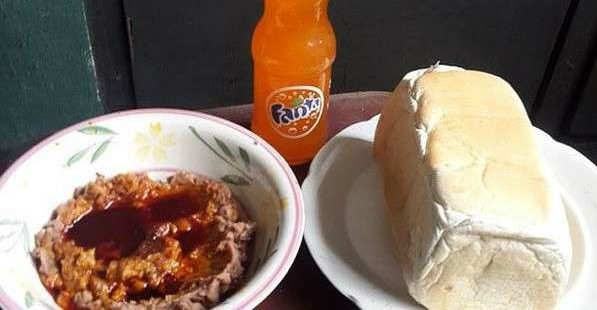Food is good for the body, providing the much-needed nourishment for energy production, repair of tissue as well providing the necessary chemical substances that will help the body fight diseases.
However, care needs to be taken irrespective of how we prepare and consume food materials as some poor cooked or raw materials could be extremely detrimental to our health and wellbeing.
below are 5 of the everyday consumable foods that can endanger your life if not properly prepared or handled with care.
1. Grated Cassava flakes/Garri

Garri is a staple food that all Nigerians can not do without. It plays an important role in our daily lives….so much so that hardly a day goes by without the consumption of this staple or its derivatives. Unfortunately, Garri is one of the most problematic staples as the raw materials used in its production; Cassava has sap that is rich in cyanides and aflatoxins.
Cyanides are very dangerous chemicals that are capable of killing humans by interfering with the red blood cell’s oxygen uptake and may result in respiratory failure in severe cases. Even worse is that no amount of processing entirely gets rid of all the cyanide in the garri, but the good news is that it can be reduced to consumable levels.
Proper processing should ensure that you don’t get killed by the staple you love but moderate consumption is still advised.
2. Bread

Agege Bread is produced in many Bread Bakeries across Lagos State. Most of these bakeries are unregistered and/or unsupervised by health monitoring agencies in the State or Local governments.
Agege bread comes in various sizes and is usually produced in 2 shifts, night and day. Thus the bread is available hot (warm) and oven-fresh in the morning and evening. The loaves of bread are appropriately priced to suit every pocket.
There are however a few health challenges resulting from the massive consumption of Agege Bread by Lagos residents. The hygiene of the product right from the bakery to its selling point cannot be guaranteed. Although the bread loaves are brought out from the ovens hot, they are usually taken away for sale naked. Many of the bread sellers will be noticed to be wrapping up the bread inside transparent nylon bags by the roadside where they are being sold to the public. Occasionally, some of the dirty loaves are cleaned with dirty rags by the roadside. It is, therefore, obvious that not many of the bread loaves are hygienic for human consumption.
Concerning the actual contents of the bread, some health problems can also arise. The basic flour used is from white wheat flour. It is a sure cause of high blood sugar unlike if whole-grain wheat has been used. Thus diabetics and those likely to develop diabetes are warned to stay off this kind of product.
Furthermore, Agege bread is high in table salt and refined sugar. High intake of table salt predisposes to the development of high blood pressure while a high intake of refined sugar is a well-known cause of Diabetes. Thus wise adults should be wary of excessive consumption of Agege bread or else they are beautiful candidates of these silent killers ravaging our present-day society.
3. Akara

Akara also known as bean cakes are a morsel filled with joy for many, especially when taken hot with pap, custard or bread. However, there are growing health concerns as regards the oil content of the delicacy as stated by Dooney’s kitchen.
In the process of its frying, each morsel absorbs loads of groundnut oil; which has a potential to be high in cholesterol and bad for the heart.
According to the site, a subsequent comment made reference to the amount of groundnut oil used in the preparation of Akara, he said;


4. Groundnuts

Groundnuts are the love of our lives….oh we love it! Especially if we have to take it Ijebu garri on the rocks. However, just like the oil derivative, one has to be careful of the consumption rate. This because poor storage of the nuts can expose them to fungal attacks which in turns increases the concentration of aflatoxin in them (yeah, aflatoxins are by-products of fungal metabolism). High concentrations of these chemicals can affect the liver in the long run. Hence, careful consumption.
Note that if you eat groundnuts and probably tastes funny it most likely may be infected by fungal and hence loaded with aflatoxins.
5. Beans

There is a general consensus in the health community is that beans are, in general, “healthy” food and that when combined with rice, form a perfect protein for vegetarians.
Beans contain a lot of soluble fibre, protein, carbohydrates, folate and iron. They also contain Lectins, which are also present in high amounts in grains. Because of their protein content, beans (legumes) often get a primary role in the diet of vegetarians, though not without cost.
According to the site wellnessmama.com, lectins in legumes are an important protective measure for the bean plant and a potentially harmful one for humans. An excerpt from Wikipedia also states that;

Obviously, some lectins have more toxic effects than others, as evidenced by the example above, but all lectins have some effect on the body. This is the reason that grains, beans, and other lectin-containing foods cannot be eaten raw.
Lectins are capable of harming the lining of the intestines, especially the microvilli. This happens when the lectins bind to the protein receptors in the intestinal lining, causing damage.
When the intestines are damaged, lectins and the foods that they bind to can pass through the intestinal wall and into the bloodstream. These sticky molecules can then wreak havoc in the bloodstream, causing diabetes and metabolic syndrome.
Technically, this write-up isn’t saying you should stop eating these foods, but that you should make sure these foods are properly prepared, so you do not end up in the hospital.
Health is wealth
stay safe




 Premier League
Premier League